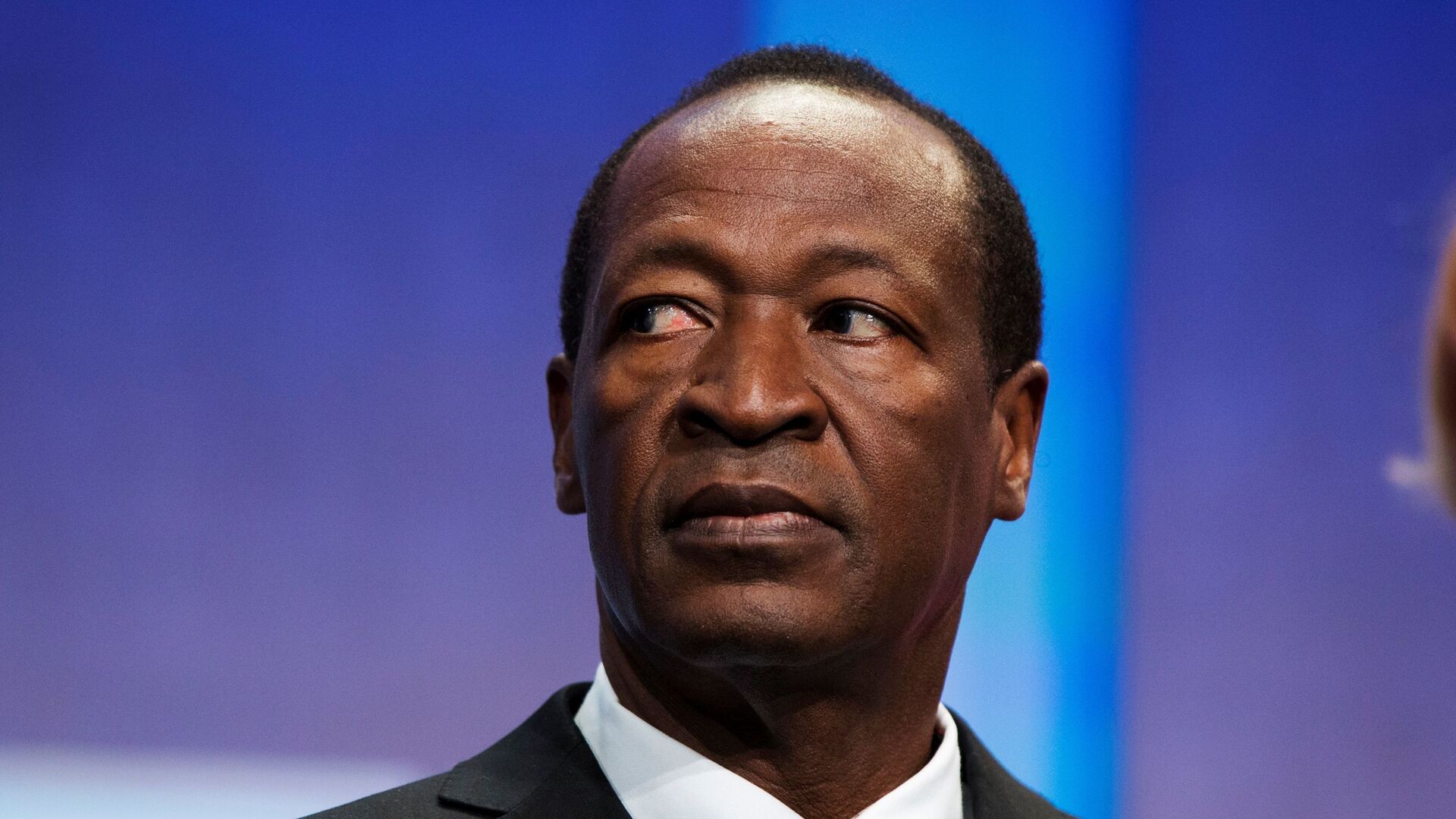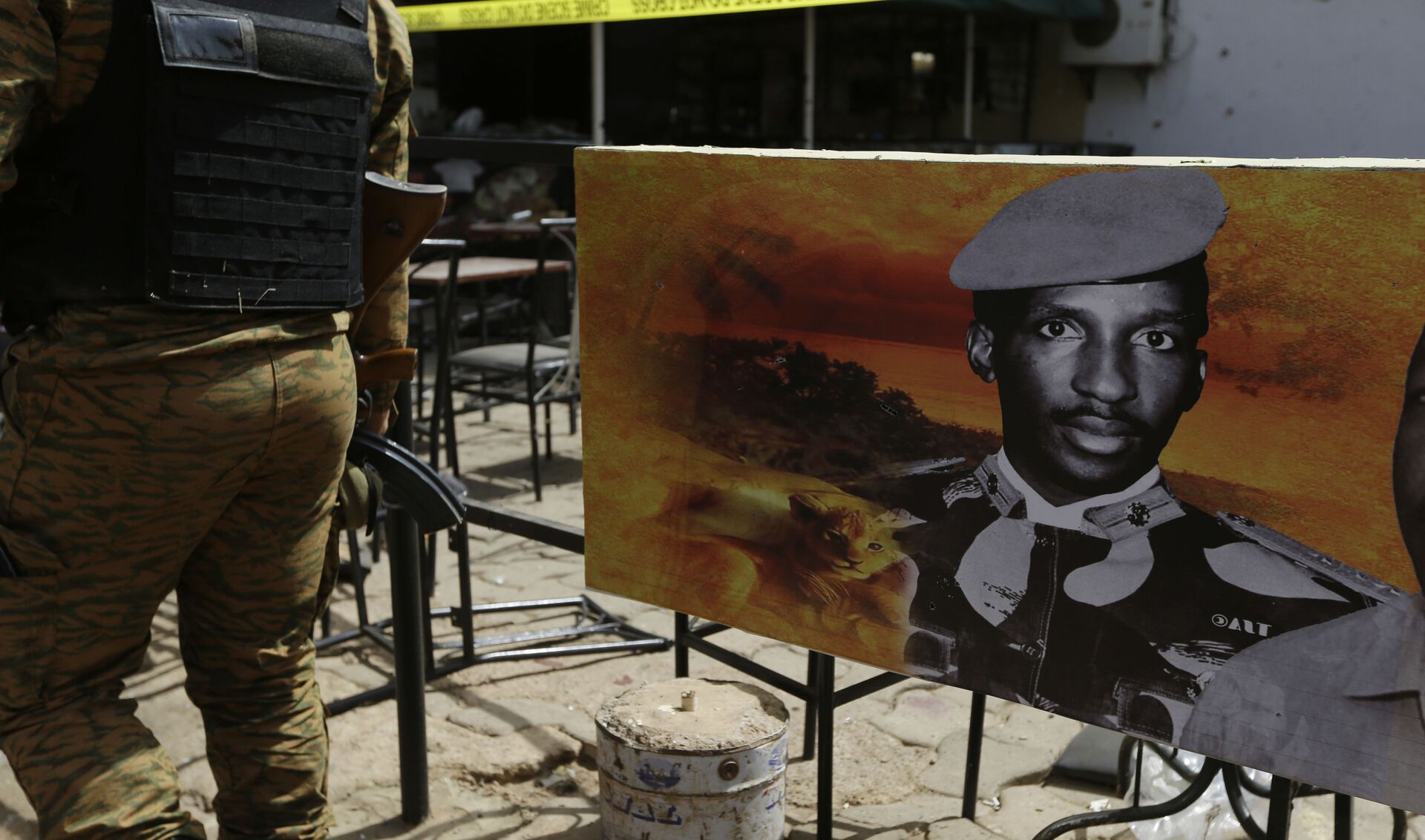https://sputnikglobe.com/20220406/ex-burkinabe-president-compaore-given-life-in-prison-for-thomas-sankaras-1987-murder-1094532996.html
Ex-Burkinabe President Compaore Given Life in Prison for Thomas Sankara’s 1987 Murder
Ex-Burkinabe President Compaore Given Life in Prison for Thomas Sankara’s 1987 Murder
Sputnik International
An Ouagadougou military court on Wednesday condemned former Burkinabe President Blaise Compaore to life in prison for the 1987 assassination of Thomas Sankara... 06.04.2022, Sputnik International
2022-04-06T19:49+0000
2022-04-06T19:49+0000
2022-11-23T11:38+0000
burkina faso
blaise compaore
trial
murder
africa
west africa
https://cdn1.img.sputnikglobe.com/img/07e5/04/0d/1082621316_0:0:3073:1730_1920x0_80_0_0_d686275f1a260da2b2398ed840747c2a.jpg
In addition to Compaore, the court also found guilty General Gilbert Diendere, Compaoré’s former right-hand man and a Burkinabe army commander at the time of the assassination who is presently in prison for a failed 2015 coup d’etat; and Hyacinthe Kafando, the former chief of presidential security chief who is believed to have led the hit squad that killed Sankara. Only Diendere was present for the trial.Their sentences exceeded those sought by military prosecutors, according to AFP. Eight other defendants were given jail terms ranging from three to 20 years and three more were acquitted.The charges were brought against the group in April 2021, but the trial only began in October and survived a coup in January by Lt Col. Paul-Henri Sandaogo Damiba, who the army named as interim president after ousting and arresting President Roch Marc Christian Kabore.At the end of the trial, the prosecution recounted the revolutionary leader’s grisly death on October 15, 1987."The squad then ordered president Sankara and his colleagues to leave the room. They would then be killed one by one,” the prosecutors said. According to ballistic experts, Sankara was shot in the chest at least seven times using tracer rounds, which are bullets fitted with a small pyrotechnic charge that makes them visible at night and burns at some 1,400 degrees Fahrenheit. He was 37 years old.However, the defendants claimed that the intent had been to arrest Sankara, not kill him.Land of Upright PeopleSankara was appointed prime minister in 1983, when the country still bore its colonial-era name, Upper Volta. Ironically, it was Compaore who led the coup that brought Sankara to power. Sankara was well-known in Ouagadougou for his heroism during a border war with Mali, for his staunch defense of progressive reforms as a part of prior administrations, and for being the lead guitarist in a popular jazz band called "Tout-à-Coup Jazz,” for which Compaoré was the singer.In 1984, he renamed the country Burkina Faso, meaning “The Land of Upright People” in Moré and Dyula, the two major languages of the country.Internationally, Sankara took a pan-Africanist position, supporting African solutions for African problems instead of looking to Western institutions and countries for help. He supported the revolutionary struggles of other peoples, including the Saharawi struggle for a Western Sahara independent of Spanish or Moroccan rule. For this, he is often called “Africa’s Che Guevara” after the Argentine-Cuban communist revolutionary.Sankara rejected help from Western institutions like the World Bank and International Monetary Fund and repudiated the concept of colonial debt. He also rejected direct aid, saying instead that Western countries should help African nations become self-sufficient.In the four years he was in power, he successfully realized the promise of two meals and 10 liters of water per person per day, expanding agriculture, reclaiming desert and making the country food self-sufficient. To illustrate his commitment to these goals, Sankara lived a spartan life, reduced public figures’ salaries to be comparable to the average citizen’s and forced officials to live and travel without luxury.However, Sankara’s reforms were unpopular with some of the country’s established elites, including those with ties to France. After Compaore overthrew and killed Sankara in 1987, he undid many of Sankara’s reforms, accepted Western financial aid and neoliberal reform demands, and Burkina Faso has remained one of the world’s most impoverished countries. When Compaoré was overthrown in 2014, the French Foreign Ministry hailed Burkina Faso under his rule as playing a “key role in guaranteeing regional stability and conflict resolution."
burkina faso
africa
west africa
Sputnik International
feedback@sputniknews.com
+74956456601
MIA „Rossiya Segodnya“
2022
Sputnik International
feedback@sputniknews.com
+74956456601
MIA „Rossiya Segodnya“
News
en_EN
Sputnik International
feedback@sputniknews.com
+74956456601
MIA „Rossiya Segodnya“
Sputnik International
feedback@sputniknews.com
+74956456601
MIA „Rossiya Segodnya“
burkina faso, blaise compaore, trial, murder, west africa
burkina faso, blaise compaore, trial, murder, west africa
Ex-Burkinabe President Compaore Given Life in Prison for Thomas Sankara’s 1987 Murder
19:49 GMT 06.04.2022 (Updated: 11:38 GMT 23.11.2022) An Ouagadougou military court on Wednesday condemned former Burkinabe President Blaise Compaore to life in prison for the 1987 assassination of Thomas Sankara, the communist leader who led a brief but revolutionary period of reform in Burkina Faso.
In addition to Compaore, the court also found guilty General Gilbert Diendere, Compaoré’s former right-hand man and a Burkinabe army commander at the time of the assassination who is presently in prison for a failed 2015 coup d’etat; and Hyacinthe Kafando, the former chief of presidential security chief who is believed to have led the hit squad that killed Sankara. Only Diendere was present for the trial.
Compaore has lived in nearby Cote D’Ivoire since he was forced from power by mass protests in 2014, and the Burkinabe government has tried several times to extradite him in connection to Sankara’s death. He has denied any connection to the assassination, although numerous testimonies say he was intimately involved with the overthrow of Sankara. Compaore came to power after Sankara was killed.
Their sentences exceeded those sought by military prosecutors, according to AFP. Eight other defendants were given jail terms ranging from three to 20 years and three more were acquitted.
The charges were
brought against the group in April 2021, but the trial only began in October and
survived a coup in January by Lt Col. Paul-Henri Sandaogo Damiba, who the army named as interim president after ousting and arresting President Roch Marc Christian Kabore.
At the end of the trial, the prosecution recounted the revolutionary leader’s grisly death on October 15, 1987.
As Sankara headed to a National Revolutionary Council meeting, "his executioners were already there," the lawyers said. After Sankara entered the room, the hit squad burst in and kills his guards.
"The squad then ordered president Sankara and his colleagues to leave the room. They would then be killed one by one,” the prosecutors said. According to ballistic experts, Sankara was shot in the chest at least seven times using tracer rounds, which are bullets fitted with a small pyrotechnic charge that makes them visible at night and burns at some 1,400 degrees Fahrenheit. He was 37 years old.
However, the defendants claimed that the intent had been to arrest Sankara, not kill him.
Sankara was appointed prime minister in 1983, when the country still bore its colonial-era name, Upper Volta. Ironically, it was Compaore who led the coup that brought Sankara to power. Sankara was well-known in Ouagadougou for his heroism during a border war with Mali, for his staunch defense of progressive reforms as a part of prior administrations, and for being the lead guitarist in a popular jazz band called "Tout-à-Coup Jazz,” for which Compaoré was the singer.
In power, Sankara’s Marxist-Leninist politics brought major social reforms, such as banning both female genital mutilation and polygamy and promoting the equal rights of women. His literacy campaign boosted the country’s literacy rate from just 13% when he took office to 73% just four years later, when he was killed. He also pushed to spread basic medical care throughout the country.
In 1984, he renamed the country Burkina Faso, meaning “The Land of Upright People” in Moré and Dyula, the two major languages of the country.
Internationally, Sankara took a
pan-Africanist position, supporting African solutions for African problems instead of looking to Western institutions and countries for help. He supported the revolutionary struggles of other peoples, including
the Saharawi struggle for a Western Sahara independent of Spanish or Moroccan rule. For this, he is often called “Africa’s Che Guevara” after the Argentine-Cuban communist revolutionary.
"They have not helped us to develop. They have instead created a beggar mentality. We hold out our hands to receive food. That is not a good thing. Our farmers have stopped producing, because they cannot sell what they produce,” Sankara said of Western powers like their former colonial ruler, France.
Sankara rejected help from Western institutions like the World Bank and International Monetary Fund and
repudiated the concept of colonial debt. He also rejected direct aid, saying instead that Western countries should help African nations become self-sufficient.
"We want something else. Those who really want to help us can give us plows, tractors, fertilizer, insecticide, watering cans, drills, dams. That is how we define food aid. Those who come with wheat, millet, corn or milk, they are not helping us,” he said.
In the four years he was in power, he successfully realized the promise of two meals and 10 liters of water per person per day, expanding agriculture, reclaiming desert and making the country food self-sufficient. To illustrate his commitment to these goals, Sankara lived a spartan life, reduced public figures’ salaries to be comparable to the average citizen’s and forced officials to live and travel without luxury.
However, Sankara’s reforms were unpopular with some of the country’s established elites, including those with ties to France. After Compaore overthrew and killed Sankara in 1987, he undid many of Sankara’s reforms, accepted Western financial aid and neoliberal reform demands, and Burkina Faso has remained one of the world’s most impoverished countries. When Compaoré was overthrown in 2014, the French
Foreign Ministry hailed Burkina Faso under his rule as playing a “key role in guaranteeing regional stability and conflict resolution."



